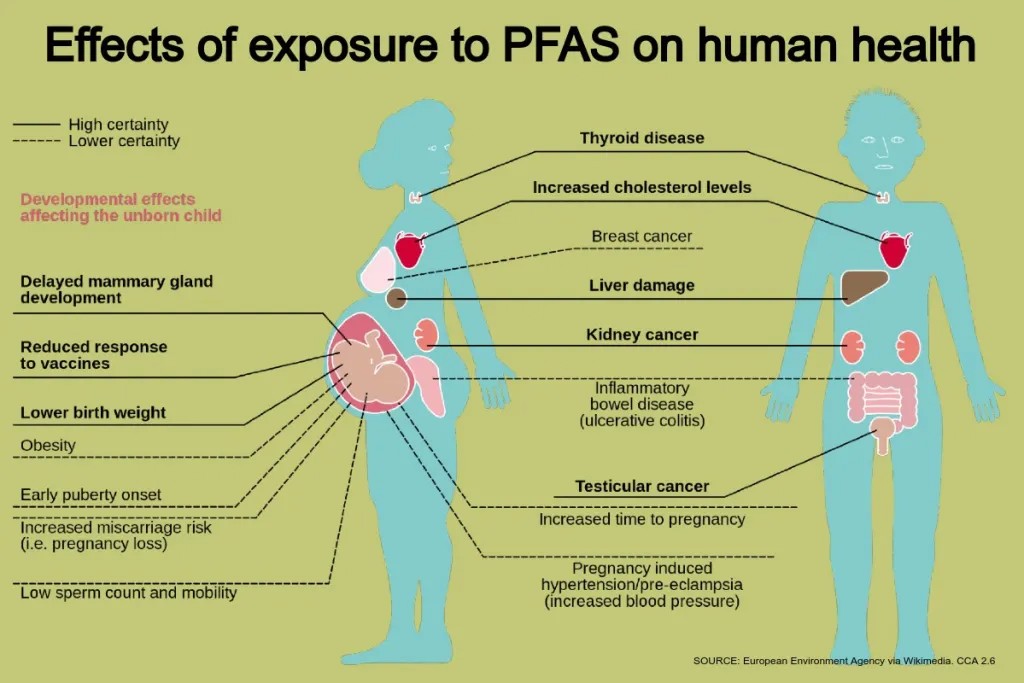
Municipal water providers across the country are pushing back on a new U.S. Environmental Protection Agency rule to reduce so-called “forever chemicals” in drinking water due to health risks – and South Carolina is no exception.
But there’s also action. In the next week, state health officials plan a briefing on the new federal rule.
Meanwhile, Charleston Water System, an independent government entity serving 500,000 residents in the Lowcountry, describes the rule as an “unfunded mandate” that will force it to raise rates on customers while providing very few real-world benefits.

“Over 10 years, we’ll spend $200 million to remove 3 to 5 parts per trillion (ppt) from your drinking water, when you can just walk across your living room floor and pick up half a million [ppt] from dust in your first breath,” Charleston Water System spokesman Mike Saia told Statehouse Report. “And that cost will have to get passed along to ratepayers.”
David Blaize, executive director of the South Carolina Water Associations directed Statehouse Report to an April 10 statement from the American Water Works Association (AWWA).
“AWWA estimates the cost of the rule is more than three times higher than the agency’s calculations,” the statement reads. “The magnitude of these additional costs will lead to affordability challenges in many communities.”
Mixed legislative reactions
So far, reaction from state leaders has been mixed.

“Putting much-needed additional limits on the amount of forever chemicals in drinking water is vitally important,” said Charleston Democratic state Rep. J.A. Moore, who first introduced clean water reform legislation in 2018. “These chemicals cause permanent damage to folks and can lead to everything from cancer to other life-threatening illnesses.”
Charleston Republican Sen. Chip Campsen said that, in light of CWS’s comments regarding compliance costs, he’d like to see a rigorous, evidence-based examination of the new rule.
“Maybe there’s a compelling reason to do this,” Campsen said. “But we need to do a real cost benefit analysis instead of having it handed down by the Biden administration.”
What are forever chemicals?
At issue are what experts call per-and polyfluoroalkyl substances (PFAS), a class of almost 15,000 synthetic chemicals that have been used since the 1950s to make fluoropolymer coatings and products that resist heat, oil, stains, grease and water.
Dubbed “forever chemicals” because they break down very slowly in the environment, PFAS have been found at high levels in everyday products like furniture, hamburger wrappers and stain-resistant clothing, and in common foods such as seafood, chocolate cake and microwave popcorn.
According to federal studies, 97% of Americans have some amount of PFAS in their blood. But average blood concentrations have declined by 85% since 1999 when many companies began phasing PFAS chemicals out of their products.
The new EPA rule would require water systems to reduce PFAS levels to 4 ppt or less by 2029. For perspective, 1 ppt is the equivalent of about 1 grain of sand in an Olympic-sized swimming pool.

A local impact with statewide implications
Quarterly testing has consistently shown PFAS levels of between 5 and 10 ppt in Charleston drinking water since 2018, CWS officials say.
“We understand that people want the water to be PFAS free – and we want the water to be PFAS free,” Saia said. “But when you’re talking about removing less than 5 parts per trillion at a cost of $200 million, … that’s a tremendous amount of money for an absolutely miniscule reduction in PFAS exposure.”
As previously reported in Statehouse Report’s sister publication, Charleston City Paper, PFAS chemicals have been found at high concentrations in the Lowcountry for years.
- Marine mammals. A series of tests conducted between 2003 and 2013 discovered “some of the highest levels of PFASs in marine mammals throughout the world.”
- Groundwater. In 2018, groundwater testing at Joint Base Charleston revealed PFAS levels of 1.15 million ppt.
- Local fish. A 2023 S.C. Department of Health and Environmental Control study found fresh-caught fish from the Ashley River and Goose Creek Reservoir with 14,900 ppt.

Riley Egger, director of land, water and wildlife programs for the Coastal Conservation League, agrees PFAS chemicals are found at high levels throughout the environment, and that South Carolina water systems will need state and federal grants to meet the new standard. Nevertheless, she says, public safety requires action.
“The appropriate amount of contamination in our drinking water is zero,” Egger said. “Getting this chemical out of our drinking water is the first step in protecting human health.”
Charleston Water System says it’s prepared to comply with the rule, but argues the science does not support the EPA’s action.
“It’s very questionable whether removing this tiny amount of PFAS will help human health,” Saia said. “But it’s absolutely certain this is going to be a major expense for our customers.”
Next steps for South Carolina
The S.C. Department of Health and Environmental Control says it plans to hold a statewide briefing on the new rule next week.
“Our number one goal is to have all of South Carolina’s water systems operate in compliance with all federal and state drinking water standards that help protect people’s health,” DHEC Director of Environmental Affairs Myra Reece said in a statement.
But she also made it clearDHEC is aware of the financial challenges.
“We understand how important it is for system operators, especially small and rural ones, to have the resources and assistance they need to meet and maintain compliance.” Reece said.
To that end, DHEC has been working for months with state-owned Santee Cooper, which operates the Lake Moultrie and Lake Marion regional water systems, to determine the most effective and cost-efficient way to remove PFAS from drinking water.
The hope is that Santee Cooper’s early testing will give other, smaller water systems a leg up in meeting the new standard.
“That was the intent of starting these evaluations last year,” said Santee Cooper spokesperson Mollie Gore. “(We want) to be able to provide information back to DHEC on effectiveness and cost, so they can pass that information on (to other providers) as appropriate.”
- Jack O’Toole reports on statewide issues for Statehouse Report and the Charleston City Paper. Have a comment? Send to: feedback@statehousereport.com.















 We Can Do Better, South Carolina!
We Can Do Better, South Carolina!